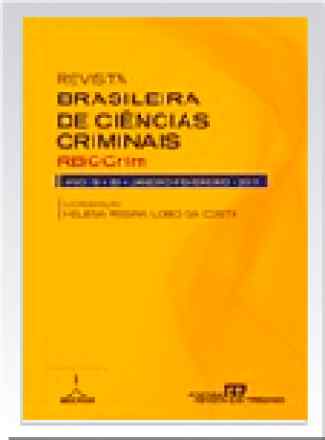“PODE ISSO ARNALDO?” UMA SÚMULA NÃO VINCULANTE, MAS QUE VINCULA E AFASTA O CÓDIGO PENAL
Revista Brasileira de Ciências Criminais
“PODE ISSO ARNALDO?” UMA SÚMULA NÃO VINCULANTE, MAS QUE VINCULA E AFASTA O CÓDIGO PENAL
Autor Correspondente: Tiago Oliveira de Castilhos | [email protected]
Palavras-chave: pena; súmulas; (não) vinculante; irrazoabilidade, proporcionalidade.
Resumos Cadastrados
Resumo Português:
O presente artigo tem por objetivo trazer à baila o seguinte problema: "existe súmula não vinculante, no Brasil, que vincula o juízo, no momento da aplicação da pena? Ela eva a pena a ficar acima do mínimo legal?". Em outras palavras: "se pode ser aplicada uma súmula em detrimento do Código Penal – CP sem ser ela vinculante e sem ser a lei aplicada ou parte dela inconstitucional". O trabalho vai discorrer se ao aplicar o Código Penal, no que se refere ao método de aplicação da pena, o intérprete passa a ser obrigado a aplicar a súmula 231 do Superior Tribunal de Justiça – STJ, que determina que a pena não pode ficar a baixo do mínimo legal. A pergunta será respondida, com esta pesquisa, se esta prática é adotada, a quanto tempo e se ela respeita a aplicação proporcional e constitucionalmente da pena. Como aplica a pena o juízo com a referida súmula, e, se ela respeita a visão e missão pós reforma de 1984 e pós Constituição de 1988.
Resumo Inglês:
This article aims to bring up the following problem: "there is a non-binding summary, in Brazil, that binds the court, at the time of application of the penalty? It pays to stay above the legal minimum ". In other words: "a summary can be applied to the detriment of the Penal Code - CP without being binding and without being the applied law or part of it unconstitutional ". The work will discuss whether, when applying the Penal Code, with regard to the method of applying the penalty, the interpreter is obliged to apply the precedent 231 of the Superior Court of Justice - STJ, which determines that the penalty cannot remain below the legal minimum. The question will be answered, with this research, if this practice is adopted, for how long and if it respects the proportional and constitutional application of the penalty. How does the judgment with the aforementioned summary apply and if it respects the vision and mission after the 1984 reform and after the 1988 Constitution.

